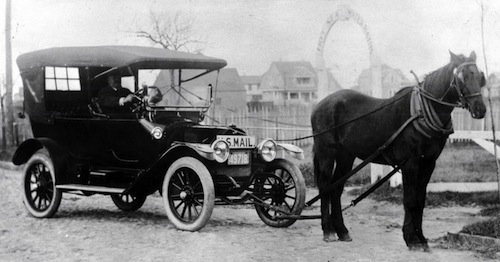Secure your place at the Digiday Media Buying Summit in Nashville, March 2-4

Digital has fundamentally changed marketing, which means brands need to evolve their strategies to keep up.
But some brands are still very hesitant to embrace digital fully. Anything new is always scary and digital is changing and evolving every day, making it even harder to keep up. Based on our discussions with brands about what goes right and what goes wrong, we came up with a list of what gets brands off track. Brands that want to be successful in digital need to embrace change, take risks, make use of data, integrate digital into all they do and place the customer first.
A common habit of brands that aren’t successful in digital is they are too business-centric, and less concerned with placing the customer at the heart of everything they do. They say they are customerc-entric, but they’re focused on making money over the short term, versus building relationships that will lead to money over the long term. This approach doesn’t work because consumers can smell it from a mile away and it completely turns them off. Thinking about your customer, is thinking about your business. For example, L.L. Bean has a no questions asked return policy. Yes, some people may take advantage of this and may be dishonest and return items after they’ve been worn once and so on, but in the long term, making customers happy is going to make them come back over and over again.
Get with the times people. If you are still dedicating the majority of your marketing budget to create flyers and billboards, then you need to come on out of the Stone Age and get with the program. The brands that most often fail in digital are the ones that reject change. Brands need to be responsive to market changes, otherwise they’ll be left behind. Flexibility is a must. The companies that are set in their ways are the ones that don’t innovate. For example, many argue that Kodak was too set in its ways. The company was so heavily involved in analog print technology and failed to embrace digital, which lead to its demise.
Safe is boring and boring is never memorable. The companies that play it safe never get too far and are never associated with anything that matters. Brands need to be testing new platforms and channels and should take risks. The fear of failing is usually what keeps brands from taking risks. Fear of being ridiculed and getting bad press. But failing can be a good thing. Brands should fail fast and learn from their mistakes. Besides, bad press is better than no press. Red Bull, for example, will always be remembered for the Stratos spectacle. Red Bull ran the risk of associating the brand with a daredevil feat that could have ended up in unmitigated disaster if Felix Baumgartner was hurt.
Ignoring the data won’t get you too far in today’s digital landscape. Smart marketers are using data to inform marketing, products and services. Those brands that ignore the data aren’t delivering the best possible experience to users. Consumers will hands-down pick the brand that’s trying hard to be relevant, over the one that’s not. Take United Airlines, which has been accused on several occasions to literally ignore what customers say about it on social media platforms. The myriad of customer complaints and even compliments produce data that United could potentially use to improve its customer service. People were so outraged one customer created the United Breaks Guitars video, which has garnered over 12 million views to date, and criticizes the airline.
One-off digital efforts don’t work. Digital needs to be intertwined into the brand’s DNA. It needs to be a part of everything the brand does. Brands that don’t understand this, will fail. For example, a campaign to support World Aids Day in 2010, failed to integrate the campaign’s microsite and other digital assets into what was advertised in print, out of home and on TV, and as a result, not a lot of money was raised.
More in Marketing

Thrive Market’s Amina Pasha believes brands that focus on trust will win in an AI-first world
Amina Pasha, CMO at Thrive Market, believes building trust can help brands differentiate themselves.

Despite flight to fame, celeb talent isn’t as sure a bet as CMOs think
Brands are leaning more heavily on celebrity talent in advertising. Marketers see guaranteed wins in working with big names, but there are hidden risks.

With AI backlash building, marketers reconsider their approach
With AI hype giving way to skepticism, advertisers are reassessing how the technology fits into their workflows and brand positioning.










